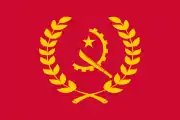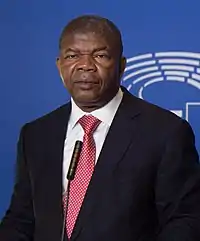President of Angola
The president of Angola (Portuguese: Presidente de Angola) is both head of state and head of government in Angola. According to the constitution adopted in 2010, the post of prime minister is abolished; executive authority belongs to the president who has also a degree of legislative powers, as he can govern by decree.
| President of the Republic of Angola | |
|---|---|
 | |
| Term length | 5 years, renewable once |
| Inaugural holder | Agostinho Neto |
| Formation | 11 November 1975 |
| Deputy | Vice President of Angola |
| Salary | 1,024,207.74 Kwanzas annually[1] |
 |
|---|
| This article is part of a series on the politics and government of Angola |
The position of president dates from Angola's independence from Portugal. Agostinho Neto held the position when his People's Movement for the Liberation of Angola (MPLA) won control of the country from the Portuguese. When Neto died in 1979, José Eduardo dos Santos succeeded him.
Under Dos Santos' leadership, Angola became a multi-party state, although controlled by him. The most recent elections, held in 1992, reelected Dos Santos with 49% of the votes. His opponent, Jonas Savimbi of the National Union for Total Independence of Angola (UNITA) party, claimed that the elections were fraudulent.
The office of the president is limited to two five-year terms.
In January 2010 the National Assembly approved a new constitution, according to which the leader of the party with the most seats in the assembly would become president, rather than a public vote taking place. The new constitution also limits a president to serving two terms, although it does not count terms served to date, and abolished the post of prime minister and introduced instead the post of vice-president.[2]
João Lourenço is the current incumbent. He ascended power on 26 September 2017.
See also
- Angola
- Lists of incumbents
- List of national leaders
References
- Manje, Bernardino. "Estado reajusta salários - Política - Jornal de Angola - Online". jornaldeangola.sapo.ao.
- Angola abolishes presidential polls in new constitution BBC News, 21 January 2010
